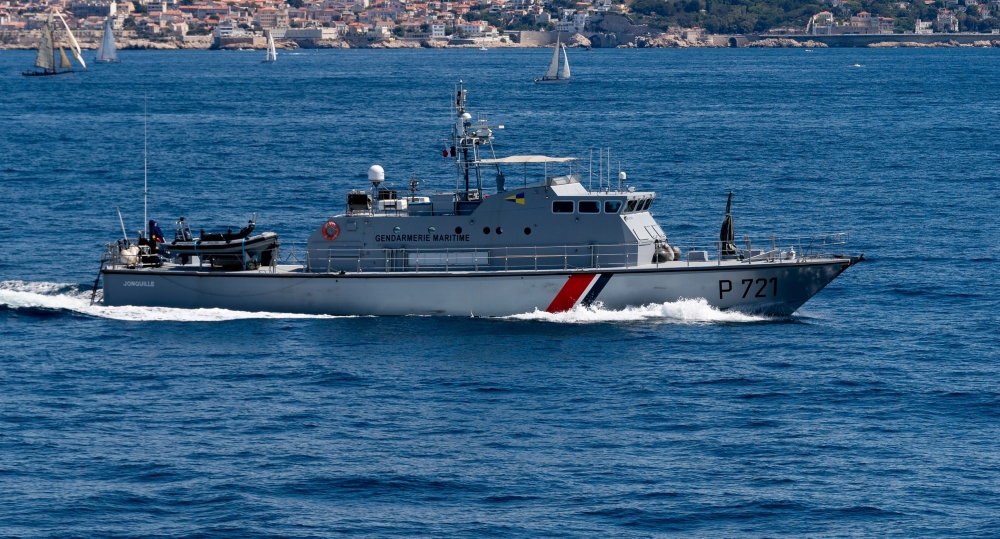
The French Navy has successfully intercepted and is currently detaining a Russian "shadow fleet" oil tanker operating under suspicious circumstances off the Atlantic coast, marking a significant escalation in European enforcement actions against Moscow's sanctions evasion network.
The oil tanker PUSHPA (also operating under the name Boracay), flying a Benin flag but suspected of false documentation, has been anchored approximately 40 kilometers off the French Atlantic coast near Saint-Nazaire since late September 2025. The 244-meter vessel, built in 2007 with IMO number 9332810, is currently positioned adjacent to the Saint-Nazaire offshore wind farm in international waters just outside French territorial limits.
The tanker departed from the Russian port of Primorsk on September 20, 2025, carrying approximately 750,000 barrels of Russian crude oil destined for Vadinar, India. However, after transiting through the Baltic Sea, around Denmark, and through the North Sea, the vessel unexpectedly diverted from its planned route to anchor off the French coast.
The French Navy has deployed significant maritime surveillance assets to monitor the suspicious tanker. A French patrol vessel has been stationed in close proximity to the PUSHPA since the vessel's arrival, maintaining continuous surveillance. According to French maritime authorities, the vessel was being actively tracked by French naval units as it rounded France's northwestern coastline before changing course toward the French shore.
The operation involves multiple French maritime law enforcement agencies, with the Brest prosecutor's office coordinating the investigation through the Maritime Gendarmerie. The case has been assigned to both the Maritime Gendarmerie Research Section and the Atlantic Maritime Gendarmerie Group. The Atlantic Maritime Prefecture confirmed they have "recently made a report to the Brest prosecutor" concerning the vessel's suspected infractions.
Meanwhile, French naval aviation assets, including ATLANTIQUE 2 (ATL2) Maritime Patrol Aircraft operating from Naval Air Station Lann-Bihoué near Lorient, maintain regular surveillance missions across the Atlantic approaches.
President Emmanuel Macron has skilfully leveraged the PUSHPA incident during the European Union leaders' summit in Copenhagen on October 1, 2025, transforming a maritime law enforcement action into a broader statement on European resolve against Russian hybrid warfare. Speaking to reporters at the EU summit, Macron confirmed that "there were some very serious offenses committed by this crew, which justify the current judicial procedure". The French president emphasized that the investigation demonstrates Europe's collective commitment to combating Russia's shadow fleet, noting that European assessment identifies between 600-1,000 vessels in Moscow's sanctions evasion network.
Macron's strategic messaging positioned France as taking decisive action while other European nations struggle with enforcement. His statements came as France deployed a 35-person military anti-drone unit with a FENNEC helicopter to Denmark to help secure the Copenhagen summit against aerial threats following mysterious drone incidents that disrupted Danish airspace.
The timing proved particularly significant as the Copenhagen summit focused on strengthening Europe's eastern front and addressing hybrid threats. Macron's emphasis on the shadow fleet investigation provided concrete evidence of European enforcement capabilities while discussions centred on theoretical defence cooperation frameworks.
The PUSHPA interception represents a critical escalation in the broader Europe-Russia confrontation, with implications extending far beyond maritime law enforcement. The vessel's potential connection to drone attacks that disrupted Danish airspace between September 22-28, 2025, transforms this from a sanctions violation into a hybrid warfare incident.
Danish authorities characterized the drone incidents as "hybrid attacks" and the "most serious attack on Danish critical infrastructure to date". The PUSHPA was identified as one of three vessels approximately 80 km from Copenhagen during the September 22 incident, when large drones forced a four-hour closure of Copenhagen Airport.
This incident demonstrates Russia's evolving strategy of using commercial vessels as platforms for hybrid operations while simultaneously evading energy sanctions. The PUSHPA's operational history reveals sophisticated sanctions evasion tactics: nine different ISM managers, four registered owners, three commercial controllers, five different names, and seven different flags since November 2022.
The broader strategic context involves European countries’ struggle to effectively counter Russia's shadow fleet operations. Despite EU sanctions covering 444 shadow fleet vessels, enforcement remains inconsistent across European waters. The French action demonstrates the potential for aggressive maritime interdiction but also highlights the challenges of coordinating enforcement across multiple jurisdictions.
Hence, France's decisive action sends a clear signal to Moscow that European nations are preparing to escalate enforcement measures against hybrid threats. By combining maritime law enforcement with diplomatic leverage during a major EU summit, Paris has effectively demonstrated how individual member states can drive broader European policy on Russian sanctions evasion.
The PUSHPA case may establish a precedent for more aggressive European interdiction of suspected shadow fleet vessels, particularly those potentially involved in hybrid warfare activities. This represents a significant evolution from passive monitoring to active enforcement, potentially reshaping the operational calculus for Russia's maritime sanctions evasion network.








